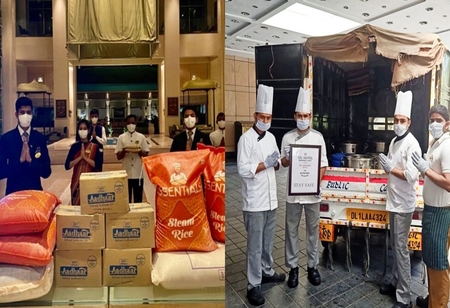One of the worst-hit industries during COVID-19 pandemic is the hospitality sector. While, the players in this segment are trying to find various ways to get back to what the business was before the crisis hit the whole world. Hence, according to researchers, humanising hotel brands can be the necessary evil to motivate tourists to return.
Researchers from the Universities of East Anglia (UAE), Bath and the West of England in the UK said that to make the re-arrival of tourists smoother, hoteliers should develop an emotional attachment with the tourists when communicating with them during these times of pandemic.
If we look at India’s scenario, the coronavirus outbreak had caused 70 days of lockdown across the country. And hence, because of this, it has crippled the hospitality industry with numerous cafes and restaurants shutting themselves down in the period of last two months. While, large hotel chains are also struggling to pay salaries to their employees and in fact some of them are even laying off their staff.
Gurbaxish Singh Kohli, vice-president of the Federation of Hotel and Restaurant Associations of India said, “We are re-calibrating [and] localising supply chains, which will change the way we operate. Every fixed cost is being reviewed afresh."
"Each hotel will have its own review geared towards greater efficiency and making operations lighter.” he added.
A spokesperson for Indian Hotels Company which is a subsidiary of Tata Group that manages properties of brands such as Taj, Vivanta, and Ginger highlighted, “Check-in and check-out formalities will be processed digitally. We have altered the designs of our lobbies, restaurants, and banquets making fewer tables available and also suspended the self-serving buffets wherever possible.” Owing to the COVID-19 virus IHCL hotels have also made the thermal screening of guests and employees the new normal procedure.
Coming to the humanizing of the hotel brands again, some crucial aspects which will be needed in order to aid this industry recover would be to emphasize shared emotional responses to risks which will enable tourists to humanise the hotel, thereby creating an emotional attachment and also increasing tourists’ intentions to visit once the crisis ends.
According to Dr Haiming Hang from the University of Bath, "Tourists experience fear and anxiety towards the health risks of Covid-19, while the hotel sector feels fear and anxiety about the uncertainty it faces."
Similarly Dr Lukman Aroean, of UEA's Norwich Business School explained that humanising hotel brands would be crucial for tourism recovery as emotional attachment can increase tourist’s intentions to visit once the crisis ends.
To reduce tourist's cognizance towards the health risks, global hotel chains including Four Seasons and Hilton have emphasized publicly about their commitment towards hygiene and cleanliness.
However, this approach fails to offer an “emotional responses to risks” and only focuses on rational/cognitive aspects of risk perceptions. Hence, “emotional responses to risks” through “humanising the brand” should be focused greatly so as to trigger emotional attachment with the tourists, along with the commitment of providing cleanliness to avoid the spread of COVID-19.
